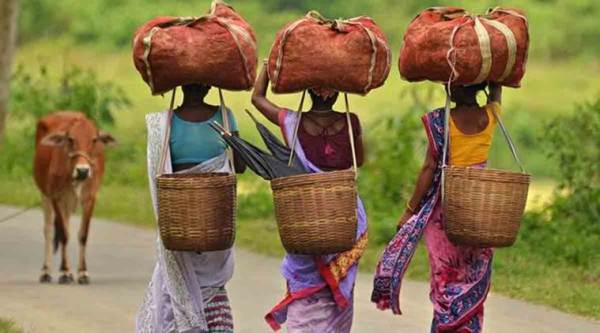
AT JAHULE village in Nashik’s Surgana taluka, formal employment for women is uncommon. In fact, 20-year-old Sunanda Gawli is the first woman in her family to get a job, thanks to a new initiative by the state’s tribal development department.
Earlier this week, 24 tribal youth completed a three-month course as caregivers, all of them set to be placed in coming days with hospitals or at residences of senior citizens requiring assistance. A second batch of 30 adivasi youth began their training on Wednesday.
The first batch that was trained in a pilot project comprises tribal youngsters above 18 years of age, who have completed Class X. They all belong to the tribal regions of Nashik, Kalwan and one from Jawhar in Palghar.
“The initiative is for skill development of tribal youth in alignment with the emerging demands in the health sector. The first batch of trainees hails from remote villages, youth who got their education in ashram schools. Most of them have dropped out after Class XII. We chose this module for training caregivers as tribal youth can get sustained employment opportunities in hospitals and nursing care in metros and emerging markets,” said Manisha Verma, Principal Secretary (tribal development).
She added that the department is looking at opportunities in the overseas markets as well, where any handholding that certified tribal caregivers may need can be provided by the state. Officials said 250 youth will be trained and employed under this initiative over the coming two years.
Like Sunanda, many of the remaining 10 girls in the first batch will be the first women in their families to get jobs, all set to move out of their villages to work in Nashik city, some in Thane.
Among the 13 men in the first batch, many will also be placed in Mumbai.
Among the 24, while a few will be placed in hospitals where they will assist in managing patients in wards and assist nurses in assisted living facilities for senior citizens, others will be posted as caregivers for convalescents or patients with medical conditions who live at home.
Dr Arun Varma, managing director of Grandage Services Private Limited, which has trained and also employed the youth, cited WHO statistics to say that India’s geriatric population will outnumber the population of the United States by 2030.
“This is a market that is not going to be saturated at all, because India doesn’t have any social infrastructure or policy on geriatric care,” he said.
Grandage, though its brand Winage, works to provide trained geriatric care across various states. Grandage is also partnering initiatives in gerontology being planned by the Union Ministry of Social Justice and Empowerment, the government of Telangana’s SC/ST Commission and the government of West Bengal’s department of employment.
Following the tribal development department’s call for proposals from private institutions on various programmes that may be beneficial to Maharashtra’s tribal population, Grandage’s proposal to train adivasi youth and then employ them as caregivers was selected for implementation.
The training is free of cost, and salaries for a home caregiver employed by Grandage are typically about Rs 10,000 per month after standard deductions, though salaries in hospitals may be lower.
“We had to make some cosmetic changes in our programme to certify and employ unemployed and marginalised tribal youth as caregivers… mainly in communication skills, as many of them speak dialects of Marathi. We also counselled them as jobs are available only in urban areas, and some conditioning is necessary to prepare tribal youngsters to live and work in an entirely different culture,” said Dr Varma.
He added that Grandage is already in touch with 15 hospitals in Maharashtra that have shown interest in appointing caregivers.
The programme is an equivalent of Level 5 of the National Vocational Qualification Framework of the National Skill Development Corporation. The course is also certified by the Ministry of Social Justice and Empowerment’s Senior Citizen Division.
It entails classroom work, an internship in a hospital and specific nursing skills, including personal hygiene, feeding, measurement of vital indicators, administering medicines through feeding pipes and psycho-social care.